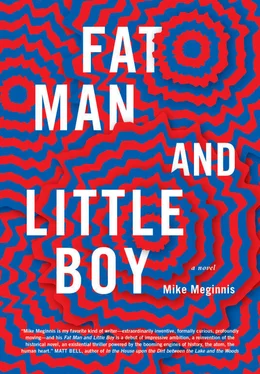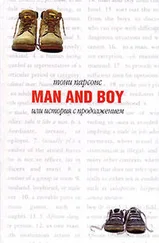The stage is where they found it. Empty, not counting the long shadow Rosie casts from the doorway, which mounts the stage and climbs the far wall. Before the stage, there are fifteen rows of chairs and stools, some improvised, some poorly repaired, some only moderately degraded by the passage of time. Several out and out broken—collapsed, legs splintered or half-gone, lopsided on the ground. On each seat, a token: a cup, a spoon, a shoe, a bracelet, several gold fillings, a toothbrush, a rubber spider, an empty can of corn, a pair of dice, shoelaces, tin jewelry, a sheriff’s star, a dog bowl, a crushed hat, a knife, yarn, needles, twine, wire, crayon, comb, candle, card, cufflink, joy buzzer, jacks, pill bottle, pencil nub, underwear, watch face, thimble, pocket change, cigarette stub, half a belt, a pie tin, buttons, a shirt collar, a zipper, nylons, tongue depressor, false teeth. They all seem on the verge of a terrible collective rattle.
“Do you really love it?” John walks along the left wall, pretending to examine the paintings, the seating. He almost trips.
“It’s depressing as hell,” says Rosie. “But wonderful.”
“It’s supposed to feel bad, you know.”
“I’m not an idiot, John.”
After Rosie and John part ways, he sees the new guest, the Japanese gentleman, approaching in a hired car. John goes to meet the car, which stops halfway down the central road dividing the hotel grounds. It’s slowed by the thick layer of mud that coats each tire. The gentleman climbs out, hopping several feet clear of the car so as to avoid the displaced muck. He’s dressed in white top to bottom. John reaches to shake. As their hands touch, they share a gaze into each other’s eyes. One of John’s knees goes crooked, corrects itself. They hold hands too long. There is perhaps a jolt of recognition. The gentleman points to the trunk and John retrieves the luggage, sinking ankle-deep in the moat of mud surrounding the car. There are many bags. The Japanese gentleman pays the driver through the window. Once John has burdened himself like a mule he leads the gentleman away, making polite conversation Rosie can’t quite hear from this distance. The gentleman does not offer to help with his bags.
She goes to her cabin. She goes to do the books, to find out how long they have left if things keep up this way.
Start at the beginning. Take the money her husband left. Reduce it by the cost of her journey, the paltry expense of the land, and the more serious cost of reconstruction. Subtract the cost of her multilingual peacetime library. Subtract her living expenses. Subtract the salaries of two employees. Subtract the cost of feeding the guests and providing them with certain niceties—complimentary chocolates, fresh towels, unlimited coal for the stoves. Subtract what she sends home to her mother to keep body and soul together. To be safe, assume two hundred dollars a year will unexpectedly catch fire and their ashes will blow away on the wind. Remember the tendency of things to become more expensive over time, and very rarely less. Add her government war widow checks. Repeat the annual deductions until the sum is zero. Three years is all they have. Two if she can bring herself to hire a real cook.
When the money runs out she’ll still have the land, the cabins. She cannot imagine where John and Matthew would go—even John is strangely childish, dependent. They need a mother. If it comes to that she can sell the books to buy time and buy food. Some of the Jewish paintings in John’s museum might be quite valuable. She could try to get a job in town.
She’s been working in bed, cross-legged, the books spread out before her. Her mud-caked shoes are looking lonesome on the floor. She falls asleep sitting up, her back against the headboard.
When she wakes it’s nearly time to practice languages. She corrects her hair. She slides into her mud-caked shoes. The sun is high and the air a little warm. Warm enough. She goes to the library. The newlyweds are in the southeast corner, hidden behind as many shelves as they can put between them and the entrance. The young husband reads an English book to his pretty wife because it sounds exotic. His pronunciation is a molasses amalgam of British and southern American. He reads her The Big Sleep . It gradually becomes clear they’re reading for the bad language, the punches, the booze, the guns, the sexual provocation—the only English words they really understand. Mrs. Dryden is asleep in a chair in the large, open reading area, a French history of the first great war fallen to the floor from her hand, open, pages down, pages bent. Rosie lifts the book, closes it, and puts it on the end table beside the old woman’s chair, marking it where it fell open. It’s unlikely that Mrs. Dryden has made it to this chapter on the war’s origins. She is a very slow reader, except in Spanish, where she takes perverse pleasure in rattling off words through a tommy gun mouth, explosively trilling her R’s, spitting consonants, rendering the lot incoherent. Not a language in her mouth: an attack.
Rosie sits down with a French dictionary and an early edition of Les Miserables . She feels the sleep coming on again. She blames Mrs. Dryden.
John’s arrival is announced by his shadow on the carpet—it blots out the sunlight that comes through the library door. He’s brought the Japanese gentleman with him.
“Mrs. Cummings,” says John.
She smiles up at him, and then the gentleman, a beautiful man.
“This is Mr. Wakahisa Masumi, our newest guest.”
“You can call me Masumi.” He tips his hat very slightly without really lifting it from his head. “I was excited to learn that you encourage your guests to learn as many languages as possible.” He glances in the direction of the invisible, tittering newlyweds. Allows himself a brief smile.
“What languages do you speak, Mr. Masumi?” says Rosie.
“Ah, this is not quite right. In Japanese names the surname is first. I would be Mr. Wakahisa. I invite you to use my first name. Just Masumi.” He goes to a bookshelf loaded with American novels. “I have English, Japanese, French, und ein bisschen Deutsch.”
“Almost four then,” says Rosie. “Congratulations, Masumi, you’ve nearly found peace.”
“Have I, then?”
“If we all knew four foreign languages there no longer would be wars. You’ve got two and a half.”
He smiles again, this time with a dark hint of irony Rosie isn’t in on. She thinks how rude it is to make faces like that—faces that make people feel too acutely their own ignorance. His eyes are sharp and bright. He stands before her with his hands folded behind his back like a proud schoolboy. She can’t begin to guess his age. It’s hard for her with Japanese. Japanese are hard for her.
John is teetering nervously on his heels.
“Will you be willing to teach us some of your language while you are here?” asks Rosie.
“Which one?” says Masumi.
“All of them! But especially Japanese.”
“It would be an honor to help you find your peace, Mrs. Cummings. Will I meet Mr. Cummings as well?”
John says, “He’s dead.”
They spend two hours together, their seats huddled in a small triangle, Masumi instructing them in the basics of Japanese pronunciation. He uses strange words as examples: murder, devil, ghost, destruction, wrath, victim, loneliness, tears. They must be important words in Japan, words frequently used in day-to-day conversation. John is unusually quiet. He doesn’t make one joke. Masumi leaves without explanation. John soon follows.
Afterward Rosie falls asleep again in the library. When she wakes, Mrs. Dryden is still out cold. The newlyweds have left. Matthew is back from school—he rides his bike past her as she leaves the library. Then it’s dinner. John cooked. Everyone eats together; the ideal time to practice languages. She wants to practice languages with them. They want to speak the words they already know. It’s typical. Matthew looks sullen. She asks him, in French, how school is treating him. He stares at her blankly; he doesn’t understand. Not so good, then. She will harangue his uncle later. The boy needs to practice his language. He doesn’t speak enough.
Читать дальше












